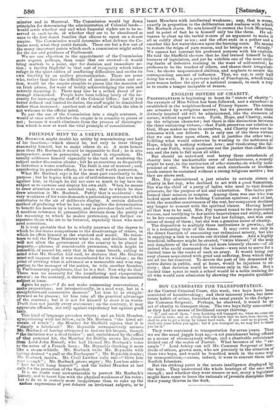ENGLISH SISTERS OF CHARITY.
PROTESTANTISM is beginning to boast its "sisters of charity": the example of Miss Sellon has been followed, and a sisterhood is established in the neighbourhood of Fitzroy Square. The sisters are actuated by a religious motive; but we presume that their divinely inspired aid will be administered, like the elements of nature, without regard to sect. Faith, Hope, and Charity, make up the religious character ; but there is this distinction between the three sustaining virtues,—that Faith preserves our relation to God, Hope makes us true to ourselves, and Charity rules our in- tercourse with our fellows. It is only one of the three virtues that we can force upon others, and it justifies the other two ; fulfilling what would otherwise be wanting to the nobleness of Hope, which is nothing without love ; and vindicating the ful- ness of our Faith, which questions not the justice that suffers the sun and the rain to fall upon all alike. But should an untoward zeal betray these sisterhoods of charity into the uncharitable error of exclusiveness, a remedy might be easy, in the institution of other sisterhoods wholly inde- pendent of sect. We believe that such sisterhoods or brother- hoods cannot he sustained without a strong religious motive ; but they are above sect. Mrs. Fry administered a just rebuke to certain sisters of charity in her day, who declined to act with a good Samaritan. She was the chief of a party of ladies who used to visit female prisoners, for the purpose of aid and exhortation. The ladies per. formed their mission in couples. Among them was one who was looked upon askance for holding Unitarian opinions; and at last, with the manifest countenance of the rest, her companion declined any longer to consort with the spiritual sinner. Having heard all that was to be said, Mrs. Fry turned round to the repudiated woman, and testifying to her active benevolence and utility, asked to be her companion. Sarah Fry had her failings, and was con- scious of many of them ; but she was a genuine sister of charity. The disposition to multiply these institutions is growing, and it is a redeeming trait of the times. It may serve not only in the direct function of succouring our redundant misery, but also in supplying a link to reunite our divided classes. And a highly beneficial influence might be created, "twice blessed," if the sons and daughters of the wealthier and more leisurely classes—of all indeed who could command the leisure—were sent to serve for a limited time in the ranks of such an army. It would bring our easy classes acquainted with grief and suffering, from which they are all too far removed. To devote the part of life demanded by active duties in public, and at home, would be injurious to so- ciety; that devotion could be virtuous only in the few. But a limited time spent in such a school would be a noble training for all who would earn admission by showing the requisite qualifica- tions.


























 Previous page
Previous page